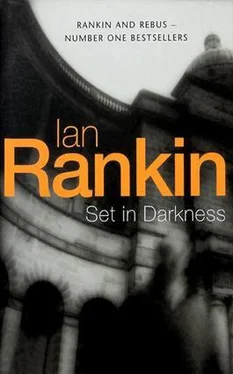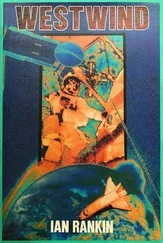‘Skelly’s gone to some specialist lab down south,’ Wylie said. ‘They reckon they can give us a more accurate date of death. But meantime the thinking is ’79 to ’81.’
‘And we know building work was going on down there in 1979,’ Hood added. ‘Which I’d say is our best bet.’
‘Based on what?’ Rebus asked.
‘Based on the fact that if you’re going to hide a body down there, you need the means and the opportunity. Most of the time, the basement was off-limits. And who’d dump a body there unless they knew about the fireplace? They knew it was going to be blocked up again, probably thought it would stay that way for a few more hundred years.’
Wylie was nodding agreement. ‘Has to be tied in to the refit work.’
‘So we need to know which companies were involved, and who was working for them at the time.’ The two junior officers shared a look. ‘I know, it’s a big job. Firms could have gone to the wall. Maybe they’re not as good at keeping old paperwork as Miss Templewhite. But they’re all we’ve got.’
‘Personnel records will be a nightmare,’ Wylie said. ‘A lot of the building trade, they take people on for a job, lay them off again afterwards. Builders move on, don’t always stay in the business.’
Rebus was nodding. ‘You’re going to have to depend on goodwill a lot of the time.’
‘Meaning what, sir?’ Hood asked.
‘Meaning you have to be nice and polite. That’s why I chose you. Someone like Bobby Hogan or Joe Dickie, they’d go barging in demanding answers. Play it like that, suddenly the person you’re talking to could become forgetful. Like the song says, nice and easy does it.’ He was looking at Wylie.
Through the gate behind her, he glimpsed the site manager emerging from the gatehouse, slipping his hard hat back on. Linford came out, hard hat in hand, and looked around, seeking Rebus. Saw him and came out of the gate.
‘Missing tools?’ Rebus asked.
‘A few bits and pieces.’ Linford nodded across the road. ‘Any news from the search parties?’ Two groups of uniforms were checking the area for the murder weapon.
‘I don’t know,’ Rebus said. ‘I haven’t seen them.’
Linford looked at him. ‘But you’ve got time to stop for tea?’
‘Just keeping my junior officers happy.’
Linford was still staring. ‘You think this is a waste of time, don’t you?’
‘Yes.’
‘Mind if I ask why?’ He folded his arms.
‘Because it’s all arse-backwards,’ Rebus said. ‘Does it really matter how he got into the site or what he was killed with? We should be looking at the who and why. You’re like one of those office managers who worries about paperclips when the case-files are ten feet high on everybody’s desk.’
Linford glanced at his watch. ‘Bit early in the day for character assassination.’ Trying to make a joke of it, aware that others were listening.
‘You can interview the site manager as much as you like,’ Rebus went on, ‘but even if you narrow it down to a missing claw hammer, how much further on will you be? Let’s face it, whoever killed Roddy Grieve knew what they were doing. If they’d been caught nicking slates, they might have thumped him, but more likely they’d just have run off. They certainly wouldn’t have kept hitting him after he was down. He knew his killer, and it wasn’t by chance that he was here. It’s to do with what he was or who he was. That’s what we should be concentrating on.’ He paused, aware that the line of workers was watching the performance.
‘Here endeth the lesson,’ Ellen Wylie said, smiling into her cup.
Roddy Grieve’s election agent was called Josephine Banks. Sitting in one of the interview rooms at St Leonard’s, she explained that she’d known Grieve for about five years.
‘We were pretty active in New Labour, right from the start. I did some canvassing for John Smith, too.’ Her eyes lost their focus for a moment. ‘He’s still missed.’
Rebus sat across from her, fingers busy exploring a cheap pen. ‘When did you last see Mr Grieve?’
‘The day he died. We met in the afternoon. Only five months till the election, there was a lot of work to get through.’
She was five and a half feet tall and carried most of her weight at the stomach and hips. Her face was small and round with the beginnings of a double chin. She’d pulled back her thick black hair and tied it at the nape of her neck. She wore half-moon glasses with Dalmatian-spotted frames.
‘You never thought of standing?’ Rebus asked.
‘What? As an MSP?’ She smiled at the suggestion. ‘Maybe next time.’
‘You’ve ambitions that way?’
‘Of course.’
‘So what made you want to help Roddy Grieve, as opposed to any other candidate?’
She wore black mascara and eyeshadow. Her eyes were green. They seemed to sparkle when she moved them.
‘I liked him,’ she said, ‘and I trusted him. He still had ideals, unlike his brother, say.’
‘Cammo?’
‘Yes.’
‘You don’t get on?’
‘No reason why we should.’
‘What about Cammo and Roddy?’
‘Oh, they argued politics whenever they could, but that wasn’t often. They only met at family occasions, and then they had Alicia and Lorna to stop them.’
‘What about Mr Grieve’s wife?’
‘Which one?’
‘Roddy’s.’
‘Yes, but which one? He had two, you know.’
Rebus was confused momentarily.
‘First one didn’t last long,’ Josephine Banks said, crossing her legs. ‘It was a teenage thing.’
Rebus turned his pen the right way round and opened his notebook. ‘What was her name?’
‘Billie.’ She spelled it for him. ‘Her maiden name’s Collins. But maybe she’s remarried.’
‘Is she still around?’
‘Last I heard she was teaching somewhere in Fife.’
‘Did you ever meet her?’
‘God no, she was long gone by the time I met Roddy.’ She looked at him. ‘You know there’s a son?’
None of the family had mentioned it. Rebus shook his head. Banks looked disappointed in him.
‘His name’s Peter. He uses the surname Grief. Ring any bells?’
Rebus was busy writing. ‘Should it?’
She shrugged. ‘He’s in a pop group. The Robinson Crusoes.’
‘Never heard of them.’
‘Some of your younger colleagues may have.’
‘Ouch.’ Rebus winced; it made her smile.
‘But Peter’s almost beyond the pale.’
‘Because of what he does?’
‘Oh no, not that. I think his grandmother’s thrilled to have a pop star in the family.’
‘What then?’
‘Well, he chooses to make his home in Glasgow.’ She paused. ‘You have spoken to the family, haven’t you?’ He nodded. ‘Only I’d have thought Hugh would have mentioned him.’
‘I haven’t actually met Mr Cordover yet. He’s the band’s producer, is he?’
‘He’s their manager. Dear me, do I have to tell you everything? Hugh’s got this thing about young bands now — Vain Shadows, Change and Decay...’ She smiled at his lack of recognition.
‘I’ll ask one of my younger colleagues,’ he said, causing her to laugh.
He went to the canteen, fetched them coffee. The burger had given him indigestion, so he stopped at his desk and downed a couple of Rennies. At one time, he could have eaten anything, any time of day. But his guts seemed to have taken early retirement. He picked up his phone and called Lorna Grieve, thinking: so far Josephine Banks hadn’t mentioned Seona Grieve. She’d managed to sidetrack him by bringing the first Mrs Grieve, Billie Collins, into play. There was no answer at the Cordover residence. He took the drinks back to the interview room. ‘There you go, Ms Banks.’
Читать дальше












